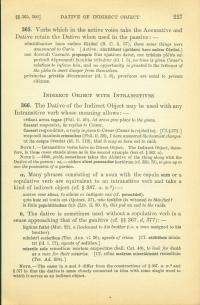366. The Dative of the Indirect Object may be used with any intransitive verb whose meaning allows.
Cēdant arma togae. (Phil. 2.20)
Let arms give place to the toga.
Caesarī respondet.
He replies to Cæsar.
Caesarī respondētur.
A reply is given to Cæsar.
(Cæsar is replied to) [Cf. § 372]
Respondī maximīs crīminibus. (Phil. 2.36)
I have answered the heaviest charges.
ut ita cuique ēveniat (id. 2.119)
that it may so turn out to each
Note 1— Intransitive verbs have no direct object. The indirect object, therefore, in these cases stands alone as in the second example (but cf. § 362.a).
Note 2— Cēdō (yield) sometimes takes the ablative of the thing along with the dative of the person.
cēdere alicui possessiōne hortōrum (cf. Mil. 75)
to give up to one the possession of a garden
a. Many phrases consisting of a noun with the copula sum or a copulative verb are equivalent to an intransitive verb and take a kind of indirect object (cf. § 367.a, Note 2).
auctor esse alicui
to advise or instigate one (cf. persuādeō)
Quis huic reī testis est (Quinct. 37)
Who testifies (is witness) to this fact?
Is fīnis populātiōnibus fuit (Liv. 2.30.9)
This put an end to the raids.
b. The dative is sometimes used without a copulative verb in a sense approaching that of the genitive (cf. § 367.d, § 377).
lēgātus frātrī (Mur. 32)
a lieutenant to his brother
(i.e. a man assigned to his brother)
ministrī sceleribus (Tac. Ann. 6.36)
agents of crime
[Cf. sēditiōnis ministrī (id. 1.17) agents of sedition]
miseriīs suīs remedium mortem exspectāre (Sall. Cat. 40)
to look for death as a cure for their miseries
[Cf. sōlus meārum miseriārumst remedium (Ter. Ad. 294).]
Note — The cases in a. and b. differ from the constructions of § 367.a, Note 2 and § 377 in that the dative is more closely connected in idea with some single word to which it serves as an indirect object.

